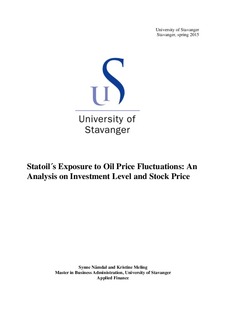| dc.description.abstract | In this thesis an econometric analysis of Statoil’s investment level and stock return has been performed, with purpose of examine the affect that fluctuations in the price of crude oil has on these variables. The results revealed that crude oil prices have a significant impact on Statoil´s stock returns, due to the direct impact the crude oil price has on Statoil’s cash flows. The investment level does not seem to be affected by either of the variables in the analysis, and this could indicate that the company has long-term commitments, and that capex has a lagged reaction to the crude oil price. Further, an investigation showed what strategies Statoil practice when the crude oil price drops, and it seems that compered to 2008, company are now investing in technology to open new renewable energy opportunities. As the demand for renewable energy and the supply for oil increases, Statoil is focusing on creating value and growth to the company and at the same time looking into utilizing oil and gas expertise and technology to open new renewable energy opportunities.
Historically OPEC has had a lot of power in the oil industry, due to their large share of the oil production. As early as 1973, (OAPEC) decided to cut supply until Israeli forces pulled out of Arab territory. This made the prices increase dramatically. In 2014, OPEC decided not to reduce their supply of oil when demand declined, which resulted in an oil price decrease that went from $80bbl in October down to $65bbl in November. During the writing of this thesis, the oil price has gone from approximately $45bbl in January to $64bbl in June, and there have been a reduction of field and modification costs in the sector.
The thesis concludes that the investments level is held more or less unaffected, while the return of the company´s stock decreases with drops in the price of crude oil. Statoil´s financial reports show that the company has a stable economy, allowing them to invest even when crude oil price is low. | nb_NO |

